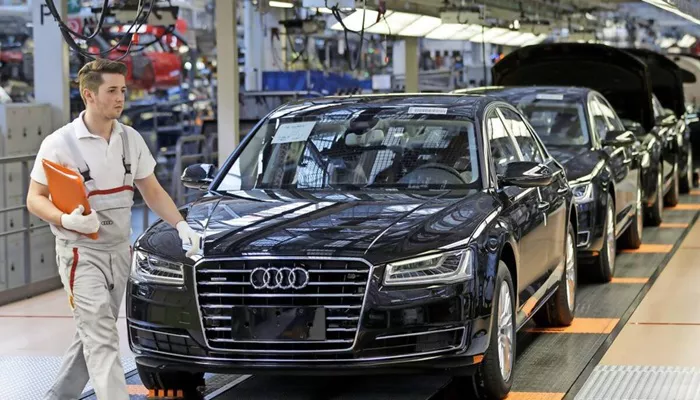Audi announced last week that it would cut 7,500 jobs by 2029 as part of a medium-term savings program aimed at saving more than €1 billion annually. The company’s decision follows the implementation of what is being called the “Agreement for the Future,” which the IG Metall union has labeled a “success.” The union is now working on how to meet the savings targets.
The job cuts will primarily affect Audi’s headquarters in Ingolstadt and its Neckarsulm location, particularly in administration, sales, and development roles. This news has raised concerns among Audi’s 55,000 employees across Germany, many of whom are anxious about the impact on their families. One worker from Neckarsulm told Südwest Rundfunk radio that the announcement was “not a day to rejoice.”
However, Audi’s General Works Council Chairman Jörg Schlagbauer, who is not personally affected by the job cuts, defended the move. He called the reduction of 7,500 jobs justifiable, noting that the company initially proposed cutting 12,000 jobs. IG Metall and the works council had been negotiating with Audi management for months behind closed doors. As part of the plan, wages will also be reduced, following a similar move at Volkswagen. Audi employees will see their profit-sharing payments cut, with the payout for 2024 dropping from €8,840 to €5,310.
Despite these cuts, Audi is aiming for a stronger profit margin in the future. The company’s margin, which has recently been below 5 percent, is expected to reach double digits by 2029 as part of the savings program. However, it remains unclear what other cost-cutting measures could affect workers in the coming years.
Audi’s profits fell by about one-third last year, primarily due to the closure of its Belgian plant, which led to the loss of 3,000 jobs. The company also reported a drop in sales in 2024. Audi delivered fewer vehicles in 2024, with sales of luxury cars and motorcycles falling from over 1.9 million in 2023 to just under 1.7 million. Sales in China, Audi’s largest market, also decreased by 80,000 vehicles compared to the previous year.
The company has also faced challenges in the U.S. market, where it is impacted by tariffs imposed by the Trump administration. Audi sold around 57,000 vehicles in the U.S. in 2024, which was lower than in previous years.
Due to these issues, Audi’s revenue dropped from nearly €70 billion in 2023 to €64.5 billion in 2024, and its return on investment fell from 9 percent to 6 percent. Investors have been critical of the company’s performance, and the announced job cuts and savings program are aimed at addressing these concerns.
Audi’s CFO, Jürgen Rittersberger, promised that the company would perform better in 2025, with projected revenue of €67.5 billion to €72.5 billion and an operating margin between 7 percent and 9 percent. However, he warned that the company still faces significant challenges ahead.
The company’s CEO, Gernot Döllner, highlighted the “Agreement for the Future” as a crucial step in ensuring the company’s long-term sustainability. He emphasized that management and the works council were working together to navigate these changes.
Critics of the agreement, however, argue that it masks job cuts and austerity measures under the guise of securing the company’s future. Similar agreements at Volkswagen have led to massive job losses and wage reductions, and workers are increasingly frustrated with the role of the trade unions in implementing these cuts.
The union IG Metall, which represents workers at Audi and other German automakers, has seen a decline in membership in recent years. Many workers criticize the union for supporting job cuts and for its involvement in government policies, such as the federal government’s increasing military spending.
As workers grow more concerned about job security and the rising cost of living, there are calls for greater worker organization and resistance to austerity measures. Some workers are looking for alternatives to traditional union leadership, seeking independent action committees to fight for their rights.
In conclusion, Audi’s decision to cut jobs and reduce wages is part of a broader trend in the automotive industry as companies face mounting pressure from competition and financial difficulties. While the company’s leadership and IG Metall claim these measures are necessary for long-term stability, many workers remain uncertain about their future.

